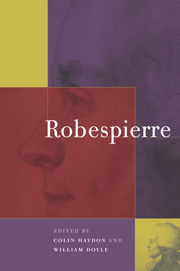Book contents
- Frontmatter
- Contents
- List of contributors
- Acknowledgements
- List of abbreviations
- Part I Introduction
- Part II Robespierre's outlook
- Part III Robespierre's politics
- 7 Robespierre and the press
- 8 Robespierre, the war and its organisation
- 9 Robespierre and the insurrection of 31 May–2 June 1793
- 10 Robespierre and the Terror
- Part IV Robespierre in retrospect
- Part V Conclusion
- Index
10 - Robespierre and the Terror
Published online by Cambridge University Press: 14 January 2010
- Frontmatter
- Contents
- List of contributors
- Acknowledgements
- List of abbreviations
- Part I Introduction
- Part II Robespierre's outlook
- Part III Robespierre's politics
- 7 Robespierre and the press
- 8 Robespierre, the war and its organisation
- 9 Robespierre and the insurrection of 31 May–2 June 1793
- 10 Robespierre and the Terror
- Part IV Robespierre in retrospect
- Part V Conclusion
- Index
Summary
Robespierre's association with the Terror was the product of the interaction between his temperament, his principles and his reaction to the political events in which he was totally absorbed from 1789 onwards. The first of these is the most elusive, since the evidence is scanty and often distorted by political bias. The little that has survived from the first thirty years of his life suggests that he grew up as a typical eighteenth-century provincial intellectual with some literary aspirations. His membership of the Arras Academy and of the light-hearted literary society, the Rosati, for which he produced occasional poems, together with one or two rather formal letters to young ladies, all conform to this pattern. He also enjoyed a reputation for disinterestedness. There are hints of a somewhat acerbic attitude towards his legal adversaries: in 1786, he was reprimanded by the Arras bar for ‘outrageous remarks respecting the authority of the law and jurisprudence and insulting to the judges’.
The essays that he wrote for academy prizes drew heavily on Montesquieu, stressed the leading rôle of men of letters in the formation of public opinion and emphasised the social importance of religion, on the ground that ‘philosophy is unknown to the people’. In one of his cases, in 1786, he made three references to ‘the scum of society’. When treating the legal status of bastards, he asserted that ‘politics itself is nothing save public morality’.
- Type
- Chapter
- Information
- Robespierre , pp. 155 - 174Publisher: Cambridge University PressPrint publication year: 1999



